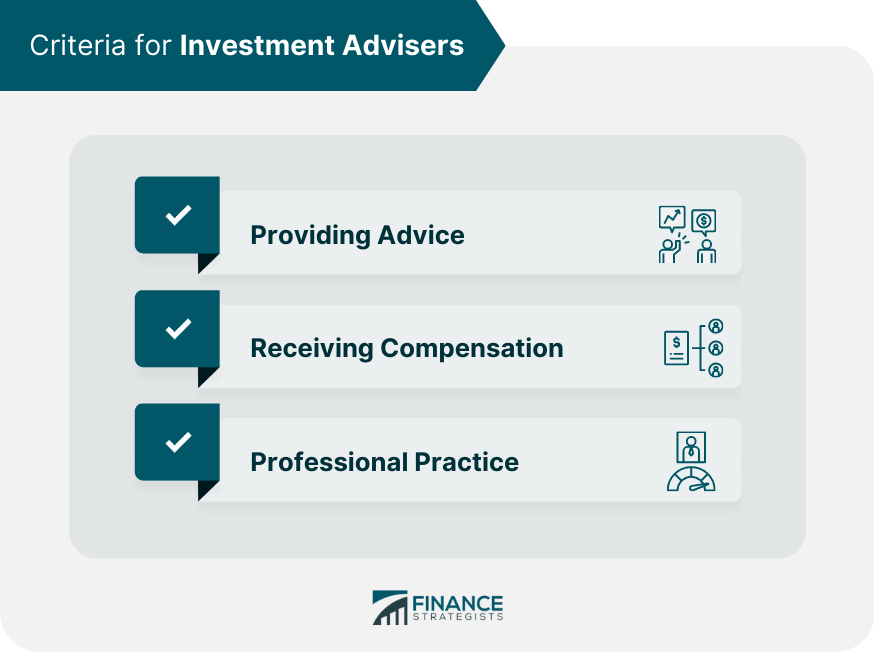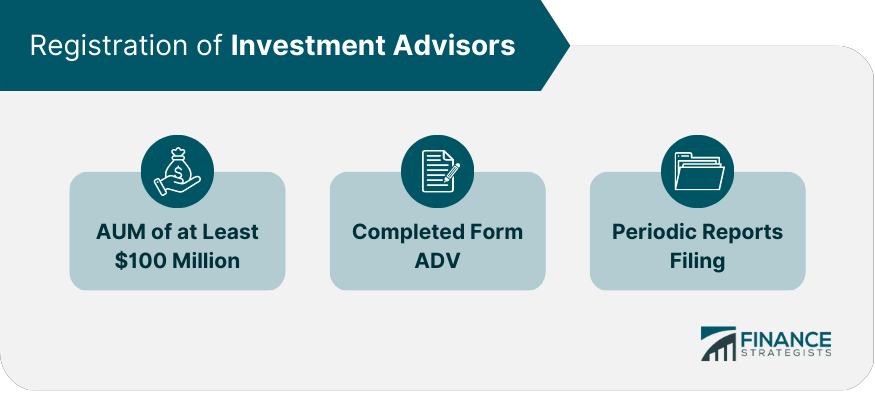The Investment Advisers Act is a legal framework that governs the activities of investment advisers. The Act mandates that firms and individuals who offer securities investment advice to clients for compensation must register with the Securities and Exchange Commission (SEC). The regulatory provisions are designed to safeguard the interests of investors from potential harm. It promotes transparency and accountability in the securities industry and protects investors from fraud and other forms of misconduct. Under the Act, investment advisers must also disclose certain information to clients, such as their fees and potential conflicts of interest. In addition, the Act establishes standards of conduct for investment advisers, including a fiduciary duty to act in their client's best interest. The Act was enacted in response to a series of financial scandals and the increasing need for investor protection. In the years leading up to the Act's creation, the stock market crash of 1929 had led to a lack of trust in the financial industry and the regulatory framework that governed it. A number of high-profile cases of fraud and misconduct also highlighted the need for stronger oversight of investment advisers. The SEC was established in 1934 to help address these concerns and to restore investor confidence in the securities industry. However, it soon became apparent that more specific regulations were needed to ensure that investment advisers acted in their clients' best interests. Therefore, the Investment Advisers Act of 1940 was created to fill this gap in the regulatory framework. The Act established a comprehensive set of rules and standards of conduct for investment advisers, designed to promote transparency, accountability, and fair dealing in the securities industry. Since its inception, the Act has been amended several times to keep pace with changes in the financial landscape and address new industry challenges. The core requirement to register and act in their clients' best interests has remained largely unchanged. The concept of fiduciary duty is a fundamental aspect of the Investment Advisers Act of 1940. The Act establishes a legal framework that requires investment advisers to act in their clients' best interests and adhere to a strict set of ethical and professional standards. The Investment Advisers Act of 1940 specifically mandates that investment advisers owe a fiduciary duty to their clients. It is a combination of legal and ethical obligations requiring investment advisers to prioritize the interests of their clients over their own. They have to avoid any situations that could create conflicts of interest and compromise the integrity of their advisory relationship. Investment advisers must provide advice that is best suited or most appropriate for their clients' financial situation and investment objectives. Advisers must avoid self-benefitting transactions at the expense of the client. The fiduciary duty also requires advisers to disclose any conflicts of interest to clients and to obtain their clients' informed consent before engaging in any transactions. The criteria for determining who is and who is not an investment adviser is based on three key factors namely, the type of advice given, the method of compensation, and whether the adviser's primary professional function is providing investment advice. According to the Act, individuals or firms that provide advice or make recommendations on securities for compensation are considered investment advisers. The Act defines securities broadly to include stocks, bonds, and other financial instruments. Individuals whose advice on securities is not their primary professional function or is merely incidental to their primary business may not be considered investment advisers under the Investment Advisers Act of 1940. Financial planners and accountants may be considered investment advisers or may not, depending on the nature of their services. Investment advisers who are compensated for their services must generally register with the SEC or state securities regulators. Under the Investment Advisers Act of 1940, investment advisers are generally required to register with the SEC or with the state in which they do business. The registration requirement protects investors by ensuring that investment advisers meet certain standards and abide by certain rules. An investment adviser must meet certain criteria, such as having assets under management of at least $100 million or providing advice to a registered investment company. If an investment adviser is not eligible for registration with the SEC, they must register with the state. In order to register, an investment adviser must complete Form ADV, which is used to disclose information about the adviser's business, including its ownership, clients, employees, business practices, affiliations, and disciplinary history. The form is used by the SEC and state regulators to evaluate the adviser's fitness to do business and to monitor compliance with securities laws. In addition to initial registration, investment advisers must also meet ongoing reporting and regulatory requirements. This includes filing periodic reports with the SEC or state regulators, maintaining accurate records, and complying with other rules related to business practices and client interactions. Failure to register and comply with the requirements may result in fines or legal action. Investment advisers who do not need to register are listed as follows: Investment advisers, except those advising any private fund, whose clients are residents of the state where the investment adviser has its principal office and place of business, and who do not provide advice or issue reports on securities listed on a national securities exchange Investment advisers whose only clients are insurance companies Foreign private advisers Charitable organizations or their trustees, directors, officers, employees, or volunteers providing advice to charitable organizations, funds that are not considered investment companies, trusts, or other donative instruments Church plans, any person or entity eligible to establish and maintain such a plan, or any trustee, director, officer, or employee of such plan or person providing investment advice exclusively to, or with respect to, such plan or person, or any company Investment advisers registered with the Commodity Futures Trading Commission as commodity trading advisors whose primary business is not acting as an investment adviser Investment advisers solely advising small business investment companies or entities that have received notice to proceed to qualify for a license as a small business investment company Investment advisers solely advising rural business investment companies or companies that have submitted an application to the Secretary of Agriculture and have received a letter of conditions The Investment Advisers Act of 1940 plays a critical role in promoting fairness and transparency in the securities industry, protecting investors from fraud and other forms of misconduct, and establishing standards of conduct for investment advisers. The concept of fiduciary duty is a critical component of the Investment Advisers Act of 1940. Requiring investment advisers to act in their clients' best interests helps ensure that investors can have confidence in the advice they receive and the investments they make. Having assets under management of at least $100 million or providing advice to a registered investment company will require an adviser to register with the SEC. If an investment adviser is not eligible for registration with the SEC, they must register with the state. There are exemptions for certain investment advisers from the registration, including those whose clients are only residents of the state where they have business, advisers whose only clients are insurance companies, and foreign private advisers, among others. When choosing a wealth management professional, it is advisable to choose one who is SEC-registered or state-registered since they are usually governed by the Investment Advisers Act of 1940. The Act helps to protect investors from abusive practices and promotes fair and efficient markets. Overall, the Investment Advisers Act plays a critical role in safeguarding the interests of investors and maintaining the integrity of the investment industry.What Is the Investment Advisers Act of 1940?
Creation of the Investment Advisers Act of 1940
Fiduciary Duty of Investment Advisors
Criteria for Investment Advisors

Registration of Investment Advisors

Exemptions From Investment Advisor Registration
Final Thoughts
Investment Advisers Act of 1940 FAQs
The Act's main purpose is to regulate and require the registration of individuals and firms that provide investment advice to clients for compensation to protect investors from fraud and conflicts of interest. The Act established the SEC's authority to oversee and regulate investment advisers and required them to disclose their background, fees, and potential conflicts of interest to clients.
The Investment Advisers Act of 1940 is enforced by the U.S. Securities and Exchange Commission (SEC). The SEC is a federal agency responsible for regulating and overseeing the securities industry in the United States, including investment advisers. State securities regulators also have the authority to enforce the Act with respect to investment advisers operating within their respective states.
Investment advisers who manage more than $100 million in assets for clients or who provide advice to registered investment companies must register with the SEC. However, some smaller advisers must also register with state securities authorities instead.
They must register and comply with the Investment Advisers Act of 1940 if a bank, bank holding company or their separately identifiable department or division provides investment advice to a registered investment company.
The Investment Advisers Act of 1940 established a fiduciary duty for investment advisors to act in the best interests of their clients. Hence, investment advisors must act in their client's best interest as a part of their fiduciary duty.
True Tamplin is a published author, public speaker, CEO of UpDigital, and founder of Finance Strategists.
True is a Certified Educator in Personal Finance (CEPF®), author of The Handy Financial Ratios Guide, a member of the Society for Advancing Business Editing and Writing, contributes to his financial education site, Finance Strategists, and has spoken to various financial communities such as the CFA Institute, as well as university students like his Alma mater, Biola University, where he received a bachelor of science in business and data analytics.
To learn more about True, visit his personal website or view his author profiles on Amazon, Nasdaq and Forbes.











